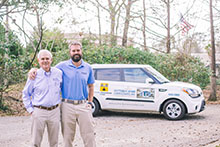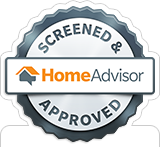Radon Testing can prevent damage and save you in the long run.
What is Radon?
Radon is a radioactive gas that has been found in homes all over the U.S. It comes from the natural breakdown of uranium in soil, rock and water and gets into the air you breathe. Radon typically moves up through the ground to the air above and into your home through cracks and other holes in the foundation. Your home can trap radon inside. Elevated levels of radon gas have been found in homes in the state of Florida.
Why should we test for radon?
- When buying or selling a home, the EPA recommends that it be tested for radon because you cannot see, smell, or taste radon.
- Locally approximately 1 out of 5 homes have tested high.
- Radon is the second leading cause of lung cancer and breathing it in over long periods of time can be a large health risk.
How does radon enter homes?
“Most houses really suck!” The indoor environment on most houses is under what is called “negative” pressure. This means that the outside higher pressure will force gases from the soil into a home. This increases the likelihood of higher concentrations of radon. Newer energy saving building techniques makes homes much “tighter” with less air infiltration. This will increase radon concentrations.
Is one home more at risk for radon than another?
In fact, no house is without risk. Whether the house is on a slab, crawl space or basement has little bearing on the radon risk. We have encountered high readings in all types of houses.
Can neighboring houses have different radon concentrations?
Soil conditions and types of soil under a home can vary from one house to the next. Very dense soils can restrict the radon gas flow. When building a home, we are required to submit soil tests for foundation design. Just as pipe clay can vary from one lot the next, soil conditions that would raise radon concentrations can vary from one lot to the next in the same neighborhood.
Should the EPA published “radon map” be used to determine if testing is needed?
This map was published to give the public an idea of the areas of the country that had “high” levels of radon concentration. The map was a statistical test with random samples and should not be used to determine if testing should be done. High concentrations have been found in areas where the map indicated low concentrations.
If you have a radon test done and the results are high, should one always move forward with mitigation?
The test results should be carefully studied. Depending upon the results, a second test should be considered, averaging the two to determine if mitigation is required. For example, heavy rains can cause elevated readings. The saturated soils can force more concentrations of gas to the dryer soils under a house temporarily elevating the readings. During tropical storm Fay, we had a test in process that came back at an alarming 21 pci/L (EPA recommends no higher than 4.0 pci/L)! After the storm a re-test resulted in below the recommended 4.0 pci/L. No mitigation was needed (pci/L is the unit of measurement for radon gas).
Who is qualified?
Radon Measurement Specialist:
- Shall work for or formally associate with a Florida certified radon business or own a certified radon measurement business
- Places and retrieves radon test devices
- Develops quality control procedures in conjunction with business or laboratory
- Evaluates, interprets and advises on radon test results
- Responds to non-routine customer inquiries
- Reviews and approves reports to customers and the Department of Health
Radon Measurement Technician:
- Shall work for or formally associate with a Florida certified radon business or own a certified radon measurement business
- Places and retrieves radon test devices
- Provides information on measurement results as directed by a radon measurement specialist
- Is supervised by a measurement specialist
Radon Mitigation Specialist:
- Shall work for or formally associate with a Florida Certified Radon Mitigation Business or own a certified radon mitigation business
- Installs mitigation systems
- Performs radon mitigation diagnostic testing
- Designs mitigation systems
- Prepares worker health and safety program
- Develops quality control procedures
- Responds to non-routine customer inquiries
- Reviews and approve reports to customers and the department
View a list of certified radon measurement businesses (18KB PDF file) offering Radon Measurement Devices, Services, and Radon Analytical Laboratory Services. These businesses use NRPP and/or NRSB radon proficient devices. If you have any questions about these radon measurement businesses call the Florida Department of Health Radon Division at 800-543-8279. Read additional information on re-certification (renewals) or Florida’s radon program.
Southern Home Consultant Utilizes Radalink RB1585 as the primary Florida Certified Lab that all of our testing goes through. All of our inspectors are Certified by the Florida Department of Health to perform placement of Radon Measurement testing. Click Here to learn more about the RadaLink Certification Process.
Southern Home Consultant Radon Certifications
Raney Oven: Certified Radon Mitigation Specialist R2098; Certified Radon Measurement Specialist R2346
Will Oven: Certified Radon Mitigation Specialist R2440; Certified Radon Measurement Technician R2073
David Waldman: Certified Radon Measurement Technician R2329
Robert Foster: Certified Radon Measurement Technician R2093
Southern Home Consultants, Inc is a Certified Radon Mitigation Business RB2140.
Contact us today to schedule your appointment
Measurement and Mitigation Certification
Radon Facts







